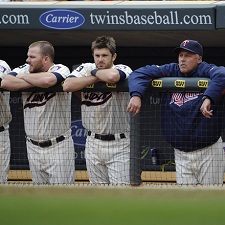TWINS LIMPING TOWARD NEXT SEASON
Sunday, September 25th, 2011These were the Minnesota Twins’ magic numbers this season: 66, 68, 69, 82, 97, 99. They were so magic they made the Twins disappear.
Those numbers represent the number of games played by two-thirds of the team’s position regulars. They help explain why the Twins are buried deep in the American League Central and will lose the most games they have lost in 30 years.
This is not what I expected of the Twins – nor did they – when I wrote about 10 days after the All-Star game that the Twins were back and ready to win their third straight division title. They did not even have a .500 record at the time – it was 47-53 – but I liked the way they were playing.
I was wary of the Detroit Tigers, who were in first place with a 53-47 record and starting to play better than they had been, but I wasn’t going to miss out on the Twins for the second time in three seasons. In 2009, when they trailed the Tigers two-thirds of the way through the season, I thought they were going to win but didn’t write it. The Twins tied the Tigers on the last day of the season, then beat them in a one-game playoff.
Figuring I would get it right this time, I didn’t think of the possibility of the Twins continuing to incur disabling injuries. They had already suffered more than their share. But to show that this was a wall-to-wall, season-long attack on the Twins, their catcher and leader Joe Mauer was diagnosed with pneumonia and won’t play the rest of the season, and two other players were involved in what was described as a minor traffic accident between their cars on their way to the airport last Thursday for the last road trip of the season.
Third baseman Danny Valencia, one of only two regulars who have avoided the disabled list this year (right fielder Michael Cuddyer is the other), and center fielder Denard Span, who recently came off the disabled list after nearly three months, did not play in Friday night’s game.
Their brief absence, however, was minor in the Twins’ 2011 scheme of horrible happenings. Through Friday night, Span had played 66 games, second baseman Tsuyoshi Nishioka 68, first baseman Justin Morneau 69, Mauer 82, Casilla 96, left fielder/designated hitter Jason Kubel 99.
With his season-ending pneumonia, Mauer serves as bookends for Minnesota’s medical madness. In the first year of an 8-year, $184 million contract, Mauer went on the disabled list two weeks into the season with bilateral leg weakness and stayed there for two months.
It was appropriate, if agonizing, for Mauer’s wrecked season to end at the Mayo Clinic, where his pneumonia was diagnosed. Mauer and Mayo are two of the best known sites in Minnesota.
 Mauer was the Twins’ starting catcher in only 47 games, and he wound up with career lows in batting average (.287), on-base percentage (.369), slugging percentage (.368) and home runs (three). Mauer’s experience epitomized the Twins’ season.
Mauer was the Twins’ starting catcher in only 47 games, and he wound up with career lows in batting average (.287), on-base percentage (.369), slugging percentage (.368) and home runs (three). Mauer’s experience epitomized the Twins’ season.
“The other night all eight starters in the lineup were players who started the season in the minors” Bill Smith, the Twins’ general manager, said, discussing the team’s unusual rash of injuries. But he also acknowledged that the Twins contributed to their downfall.
‘We haven’t played as well as we expected,” Smith said in a telephone interview Friday. “We lost some of the attention to detail, some of the fundamental things. It’s been a very frustrating season for Ron Gardenhire and his staff. They have already made plans for how they’re going to correct that next spring.”
On the other hand, the number and frequency of the injuries that struck the Twins could easily have distracted the players and undermined the Twins’ usual style of play.
“There was a time in mid-July when we were down to two guys,” Smith said, meaning two players on the disabled list, Morneau and Casilla. “We thought we would get them Friday of that week and have our full squad on the field, but Casilla aggravated his hamstring and we have three more guys on the disabled list.”
In all, the Twins have had 17 different players on the disabled list a total of 27 times, meaning 10 players have been on it twice each. According to Twins’ records, they have missed a total of 731 games. That is the equivalent of 4 ½ seasons.
In contrast, the division-champion Tigers have had 10 players on the disabled list a total of 12 times. They have missed a total of 591 days, but more than half of that time, 313 days, is attributed to two pitchers, Joel Zumaya and Brad Thomas.
Only one position player, Carlos Guillen, has missed substantial time, a total of 126 days in two visits to the disabled list.
The difference in the disabled lists is reflected in the won-lost records of the teams. Since that day in July when the Tigers led the Twins by six games, the Tigers have a 38-20 record (through Saturday) and the Twins 13-45. That’s a difference of 25 games in the standings.
The Tigers have two outstanding players in Justin Verlander the pitcher and Miguel Cabrera the hitter, but it took a mid-season addition to solidify their post-season credentials. They acquired Doug Fister, a 27-year-old right-handed pitcher, from Seattle July 31, and he has produced a 7-1 record and a 2.02 earned run average in 9 starts and 1 relief appearance.
“We clearly needed another starting pitcher, and Fister has stabilized the rotation,” geneal manager Dave Dombrowski said.
The Twins, meanwhile, looked ahead to next season.
“We’re concentrating on getting everybody healthy for the start of 2012,” Smitg said.
NO SURPRISE: SCORING DOWN
A few games remain in the regular season,  but not enough runs will be scored in them to alter the substance of the STATS report about baseball’s offense. According to the statistical service, the “recent downward trend in scoring has continued in 2011.”
but not enough runs will be scored in them to alter the substance of the STATS report about baseball’s offense. According to the statistical service, the “recent downward trend in scoring has continued in 2011.”
This season, STATS reported last week, teams were averaging 4.28 runs a game, which is the lowest average since clubs averaged 4.12 a game in 1992.
Scoring rose after expansion in1993 and 1998 but in recent years has slipped slightly but steadily. Pitching seems to have improved, but the decline in scoring is also attributed to the decline (or elimination) of use of steroids and amphetamines.
MANNY ON DECK FOR NEXT ACT
 If, when Manny Ramirez announced his retirement early this year, your reaction was “Manny, we hardly knew ye,” despair no longer. Manny wants to give us a second chance.
If, when Manny Ramirez announced his retirement early this year, your reaction was “Manny, we hardly knew ye,” despair no longer. Manny wants to give us a second chance.
Ramirez was quoted last week as saying he wanted to resume his career and was prepared to serve the 100-game suspension that prompted him to retire in the first place.
Ramirez apparently wanted to play in the Dominican Republic but was told he would first have to serve the suspension. As long as he had to sit out 100 games somewhere if he wanted to play again, he figured he might as well do it for major league money.
He’s available for delivery next August.

 Morrison, on the other hand, was not demoted for lack of hitting. He was second on the team in home runs and third in r.b.i.
Morrison, on the other hand, was not demoted for lack of hitting. He was second on the team in home runs and third in r.b.i.
 “I’m not happy,” Rodriguez told reporters the day after the initial interview. “That’s the bottom line for me. They told me one thing; they haven’t done it, and I stand by what I said.”
“I’m not happy,” Rodriguez told reporters the day after the initial interview. “That’s the bottom line for me. They told me one thing; they haven’t done it, and I stand by what I said.”
 At about the time baseball fans of college age were beginning their freshman and sophomore years in Pittsburgh last week, the Pirates were insuring that those poor, deprived students would extend their streak of never having seen a winning Pirates team in their lifetime.
At about the time baseball fans of college age were beginning their freshman and sophomore years in Pittsburgh last week, the Pirates were insuring that those poor, deprived students would extend their streak of never having seen a winning Pirates team in their lifetime.